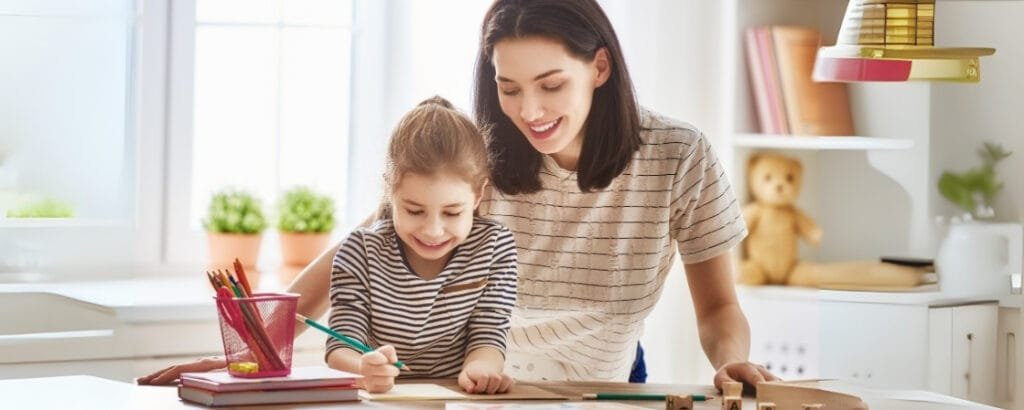
قد يبدو تعريف طفلك بلغة جديدة تحدياً كبيراً - ولكن لا يجب أن يكون كذلك! في الواقع، فإن أفضل طريقة تعليم الأطفال اللغة الفرنسية في المنزل عن طريق تحويل تعلم اللغة إلى لعبة، أو أغنية، أو جزء مبهج من روتينك اليومي. لستَ بحاجة إلى أن تتقن اللغة بنفسك - فقط القليل من الإبداع والمثابرة يمكن أن يقطع شوطاً طويلاً.
في هذا المنشور، سنستكشف خمس طرق ممتعة وبسيطة لجعل اللغة الفرنسية جزءًا طبيعيًا من يوم طفلك، سواء كان قد بدأ للتو أو تعلم بعض العبارات بالفعل. إذا كنت تبحث عن طرق سهلة ل تعليم الأطفال اللغة الفرنسية في المنزل, فأنت في المكان الصحيح.
ينجذب الأطفال بطبيعتهم إلى الإيقاع واللحن. تُعد الأغاني الفرنسية وأغاني الأطفال طريقة رائعة لبناء المفردات وتحسين النطق وجعل تعلم اللغة يبدو سهلاً. الكلاسيكيات مثل “فرير جاك”, “ألويت”, و “سور لو بونت دي أفينيون” سهلة التعلم وممتعة في الغناء.
يمكنك العثور على الكثير من الأغاني الفرنسية المجانية للأطفال على منصات مثل التجربة الفرنسية-مصدر رائع يحتوي على قصص وأغاني ودروس مصممة للمتعلمين الصغار.
نصيحة احترافية: خصصي “وقتًا مخصصًا للغة الفرنسية” كل يوم تغنين فيه أغنية أو اثنتين. ومع مرور الوقت، سيبدأ طفلك في التعرف على الكلمات وربطها بالمعنى.
إحدى أكثر الطرق فعالية في تعليم الأطفال اللغة الفرنسية في المنزل من خلال دمج اللغة في وقت اللعب. يتعلم الأطفال بشكل أفضل عندما يتمكنون من انظر ما يتعلمونه. استخدام بطاقات تعليمية تحتوي على صور وكلمات فرنسية يمكن أن يساعد الأطفال على الربط بين المرئيات والمفردات. ابدأ بالمواضيع اليومية مثل الألوان والحيوانات والأرقام والطعام. إن البطاقات التعليمية والقوافي ليست مجرد متعة - إنها أدوات قوية لـ تعليم الأطفال اللغة الفرنسية في المنزل بطبيعة الحال.
اجعلها لعبة:
تطابق الذاكرة: طابق الصورة مع الكلمة الفرنسية.
الغميضة: قم بإخفاء البطاقات التعليمية في أرجاء المنزل وقل الكلمة بالفرنسية عندما يجدها طفلك.
لعبة التخمين: “Je suis un suis animal... j'ai des rayures... qui suis-je?” (أنا حيوان ذو خطوط... من أنا؟)
يمكنك صنع البطاقات التعليمية الخاصة بك أو استخدام موارد مجانية على الإنترنت. بمرور الوقت، سيبدأ طفلك في استخدام كلمات جديدة في الحديث اليومي!
الآباء والأمهات الذين تعليم الأطفال اللغة الفرنسية في المنزل غالباً ما تجد أن المرئيات تجعل التعلم أكثر متعة وفعالية. كلما كانت اللغة الفرنسية طبيعية في منزلك، زادت احتمالية استخدام طفلك لها.
إليك كيفية دمج اللغة الفرنسية في روتينك اليومي:
تسمية الكائنات: ضع ملاحظات لاصقة عليها ملصقات فرنسية في جميع أنحاء المنزل-لا بورت (الباب), لا تشيز (كرسي), لو فريجو (الثلاجة).
استخدم عبارات بسيطة: ابدأ الوجبات بـ “بالهناء والشفاء!”, قل “شكراً” عند شكرهم، أو “ليلة سعيدة” في وقت النوم.
وقت الوجبات الخفيفة الفرنسية: حوّل وقت الوجبات الخفيفة إلى درس صغير في اللغة الفرنسية. تعلّم أسماء الفواكه أو الوجبات الخفيفة أو المشروبات باللغة الفرنسية وتدرّب على السؤال بأدب: “Je voudrais une pomme, s'il te plaît.”
لا تقلق بشأن الكمال! فالأطفال يلتقطون حماسك وسيتعلمون معك مباشرة.
هل تريد طريقة أكثر إرشادية لتنظيم تعلم طفلك؟ اطّلع على دورات اللغة الفرنسية للأطفال-تفاعلي ومناسب للعمر ومصمم لجعل تعلم اللغة الفرنسية ممتعاً وسهلاً.
يحب الأطفال القصص - ويمكن أن تكون الكتب المصورة باللغة الفرنسية طريقة سحرية لاستكشاف اللغة معًا.
لستَ بحاجة إلى فهم كل كلمة للاستمتاع بكتاب فرنسي. اختر الكتب التي تحتوي على:
الجمل البسيطة
رسوم توضيحية جميلة
التكرار والقافية
ابحث عن الكتب ثنائية اللغة أو تلك التي تحتوي على سرد صوتي، بحيث يمكنكما الاستماع والمتابعة معاً. كتب مثل “بيتي أورس برون”, “تشوبي”, أو “Les trois petits cochons” مبتدئين رائعين.
اجعل من وقت القصة لحظة ترابط، ودع طفلك يستمع إلى الإيقاع الطبيعي وصوت اللغة الفرنسية في سياقها.
نجحت العديد من العائلات في تعليم الأطفال اللغة الفرنسية في المنزل بدون أي تدريب رسمي - فقط الثبات والفضول. إذا كنت تتعلّم اللغة الفرنسية أيضًا - أو حتى مجرد التعلّم بالفرشاة - فإن ذلك يشكل مثالاً قويًا. يكون الأطفال أكثر حماسًا عندما يرون آباءهم يحاولون ويرتكبون الأخطاء ويستمتعون بتعلم لغة جديدة.
إليك كيفية نتعلم معاً:
وضع أهداف مشتركة: “هذا الأسبوع، دعونا نتعلم خمس كلمات حيوانية جديدة!”
حوارات الممارسة: لعب التظاهر وتمثيل مشاهد المقهى أو زيارة المتاجر.
مشاهدة الرسوم المتحركة بالفرنسية: اختر العروض ذات اللغة الفرنسية البطيئة والواضحة والترجمة. حتى لو لم يلتقط طفلك كل كلمة، فسوف يتناغم مع النغمة والإيماءات والمعنى.
هل تفكر في تعلم اللغة الفرنسية بنفسك؟ لدينا دورات اللغة الفرنسية للكبار مثالية للآباء والأمهات الذين يرغبون في دعم أطفالهم وتنمية مهاراتهم في الوقت نفسه.

إن تعليم طفلك اللغة الفرنسية في المنزل هو أكثر بكثير من مجرد تعلم بعض الكلمات الجديدة. إنه يتعلق بفتح باب لعالم جديد بالكامل - عالم مليء بالاكتشاف والإبداع والفرص.
فيما يلي بعض الأسباب المفيدة التي تجعل التعرض المبكر للغة الفرنسية له تأثير إيجابي دائم على نمو طفلك:
تُظهر الأبحاث باستمرار أن الأطفال الذين يتعلمون لغة ثانية في مرحلة مبكرة من حياتهم يتمتعون بفوائد معرفية تتجاوز اللغة نفسها. عندما يتدرب طفلك على اللغة الفرنسية، فهو لا يكتفي بحفظ المفردات فحسب، بل يدرب دماغه على التفكير بمرونة أكبر.
غالباً ما يظهر الأطفال ثنائيو اللغة أقوى:
قدرات حل المشكلات
الاحتفاظ بالذاكرة
مهارات تعدد المهام
التحكم في الانتباه
يمكن نقل هذه المهارات العقلية إلى كل مادة يتعلمونها في المدرسة، من الرياضيات والعلوم إلى القراءة والكتابة. وببساطة، فإن تعلم اللغة الفرنسية يمنحهم تمرينًا لعقولهم ويهيئهم للنجاح داخل الفصل الدراسي وخارجه.
اللغة أكثر من مجرد كلمات - إنها بوابة لفهم كيف يعيش الآخرون ويفكرون ويعبرون عن أنفسهم. عندما يتعلم طفلك اللغة الفرنسية، فإنه يتعلم أيضًا:
الثقافات الناطقة بالفرنسية في أوروبا وأفريقيا وكندا وأفريقيا, ومنطقة البحر الكاريبي
تقاليد مثل يوم الباستيل, المطبخ الفرنسي, و عادات سرد القصص
طرق مختلفة لرؤية العالم
هذا النوع من التعرض يعلم الأطفال أن التنوع شيء يجب الاحتفاء به وليس الخوف منه. كما أنه يجعلهم أكثر تعاطفاً وانفتاحاً وفضولاً تجاه الأشخاص من خلفيات مختلفة - وهي مهارة حياتية أساسية في عالمنا الذي يزداد ترابطاً.
اللغة الفرنسية هي إحدى أكثر اللغات انتشاراً في العالم، حيث تُستخدم في أكثر من 29 دولة في قارات متعددة. كما أنها إحدى اللغات الرسمية للمؤسسات العالمية الرئيسية مثل:
إن الأمم المتحدة
إن الاتحاد الأوروبي
إن الصليب الأحمر الدولي
والمزيد
سواء كان طفلك يحلم بأن يصبح دبلوماسياً أو مصمماً أو عالماً أو طاهياً أو رائد أعمال، فإن تحدث اللغة الفرنسية سيمنحه ميزة كبيرة. تقدر العديد من الجامعات والشركات المتقدمين الذين يتحدثون لغتين - ليس فقط لمهاراتهم اللغوية، ولكن لقدرتهم على التكيف والتواصل والتواصل عبر الثقافات.
قد يبدو تعلم لغة جديدة وكأنه مغامرة كبيرة. وعندما يدرك طفلك أن بإمكانه فهم أو قول شيء ما باللغة الفرنسية، ترتفع ثقته بنفسه.
تساعد المكاسب الصغيرة - مثل طلب كرواسون باللغة الفرنسية في الإجازة أو غناء أغنية كاملة - في بناء عقلية النمو. يبدأ طفلك في رؤية الأخطاء ليس كفشل، بل كجزء من عملية التعلم. يتعلم المثابرة والمرونة والفرح بالتقدم.
وكلما بدأت هذه الثقة تتطور في وقت مبكر، زادت احتمالية انتقالها إلى مجالات أخرى من الحياة - المدرسة والصداقات والهوايات وغيرها.
أدمغة الأطفال مهيأة لاستيعاب اللغة - خاصة في سنواتهم الأولى. في الواقع، كلما كان الطفل أصغر سنًا عند تعرضه للغة ثانية، كلما كان من السهل والطبيعي أن يتعلمها بسهولة أكبر. يميل نطقهم للغة إلى أن يكون أكثر شبهاً باللغة الأم، ويكون مستوى راحتهم في التنقل بين اللغات أعلى بكثير.
من خلال البدء بتعليم اللغة الفرنسية في المنزل، ولو بطرق صغيرة ومرحة، فإنك تستفيد إلى أقصى حد من “نافذة تعلم اللغة” هذه. أنت لا تعلّمهم الكلمات فقط - بل تساعدهم في بناء أساس هوية ثنائية اللغة ستفيدهم مدى الحياة.
تذكر أن الهدف ليس جعل طفلك يتقن اللغة بطلاقة بين عشية وضحاها، بل إثارة اهتمامه واستمتاعه بلغة جديدة. يجب أن يبدو تعلم اللغة وكأنه مغامرة مثيرة، وليس عملاً روتينيًا. احتفل بالانتصارات الصغيرة - مثل نطق أول جملة فرنسية، أو التعرف على كلمة في الرسوم المتحركة، أو الغناء مع أغنية فرنسية دون أن يطلب منك ذلك. إحدى أسهل الطرق ل تعليم الأطفال اللغة الفرنسية في المنزل باستخدام الوسائل البصرية مثل البطاقات التعليمية.
اسمح لطفلك بقيادة الوتيرة، وتكيف مع ما يثيره أكثر. بعض الأطفال يحبون الغناء والرقص، والبعض الآخر يحب الرسم أو رواية القصص أو التظاهر باللعب. لا يوجد نهج واحد يناسب الجميع - ما يهم هو أن يشعر طفلك بالتشجيع والدعم والحرية في الاستكشاف حسب إيقاعه الخاص.
طالما أنهم يستمتعون بوقتهم فهم يتعلمون. وعندما يكون التعلّم ممتعاً، فإنه يستمر.
إن دمج حتى بضع دقائق فقط من اللغة الفرنسية في روتينك اليومي - من خلال الأغاني أو الألعاب أو العبارات القصيرة - يمكن أن يحدث فرقًا كبيرًا. أبقِ الأمور خفيفة ومرحة وخالية من الضغط، وستساعد طفلك ليس فقط على بناء المفردات اللغوية، بل ستساعده أيضًا على بناء الثقة والفضول وحب اللغات. تساعدك برامجنا عبر الإنترنت على أن تتعلم بثقة تعليم الأطفال اللغة الفرنسية في المنزل مع إرشادات الخبراء.
سواء كنت قد بدأت للتو في تعلم اللغة الفرنسية في المنزل أو تشعر بأنك مستعد لإعطاء طفلك أساساً أكثر تنظيماً، فنحن هنا لدعمك في كل خطوة على الطريق.
نحن في Lingua Learn، نؤمن بأن تعلم لغة جديدة يجب أن يكون جذاباً ومناسباً للعمر وممتعاً. تم تصميم دوراتنا لتعليم اللغة الفرنسية للأطفال من قبل معلمي اللغة الذين يفهمون كيف تتعلم العقول الصغيرة بشكل أفضل - من خلال التفاعل والخيال والتشجيع.
هل أنت مستعد للبدء؟ استكشف دروسنا عبر الإنترنت المصممة لمساعدتك تعليم الأطفال اللغة الفرنسية في المنزل بثقة ومتعة!
اكتشف دروس اللغة الفرنسية للأطفال - طريقة مثالية لتنمية اهتمام طفلك باللغة الفرنسية من خلال الدروس الموجّهة والأنشطة التفاعلية والمعلمين ذوي الخبرة الذين يجعلون التعلّم ممتعاً.
تعلم اللغة الفرنسية كأحد الوالدين - لأن التعلم معاً يجعل الأمر أكثر جدوى. سواء كنت مبتدئاً تماماً أو مبتدئاً، لم يفت الأوان بعد لبدء رحلتك اللغوية الخاصة بك.